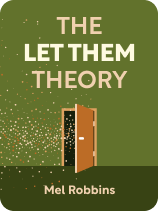

This article is an excerpt from the Shortform book guide to "The Let Them Theory" by Mel Robbins. Shortform has the world's best summaries and analyses of books you should be reading.
Like this article? Sign up for a free trial here.
Do you often feel like you’re wasting energy on things? What is the Let Them Theory?
Mel Robbins’s Let Them Theory teaches us to detach from situations and behaviors that are outside our sphere of influence. It involves shifting your mindset to take control of what you do and how you spend your time and energy.
If you want to put your energy in the right place, read more about Robbins’s theory below.
What Is the Let Them Theory?
What is the Let Them Theory? Robbins’s framework helps you determine what you can and can’t control so you can spend your energy wisely. She explains that we have a natural need to feel like we’re in control because we fear that things will go wrong if we aren’t in control—and we think that if we can just influence those around us, we’ll find a way to make our lives better and avert potential problems. But we can’t control other people’s actions or opinions, and trying to do so just makes us more stressed, anxious, miserable, and drained. It saps our energy, robs us of our peace of mind, and distracts us from creating the lives we want.
| How We’re Wired to Seek Control Neuroscience research suggests our desire for control is biologically hardwired, not just culturally learned. Researchers have found that believing we can control our environment (and attempting to) is not merely preferable: It’s a psychological and biological imperative for survival. Our brain’s reward system reinforces this drive for control. When we make choices, even inconsequential ones, we activate a network of brain regions that produces rewarding feelings. The biological need for control explains why people prefer situations offering choice over non-choice ones, even when the outcomes are identical. The removal of control, meanwhile, triggers significant stress responses. This suggests that when we try to control others, we’re attempting to satisfy a fundamental biological drive. The anxiety we feel when we can’t control others isn’t just psychological discomfort—it’s our brain’s ancient warning system telling us our survival might be threatened. |
To escape the trap of trying to control what other people do and say, Robbins contends you have to acknowledge that you can’t manage everyone else’s opinions, judgments, and feelings and redirect your energy and focus to what you can control. She explains that to do that, you can use two simple phrases: “Let Them” and “Let Me.”
“Let Them” and “Let Me”
When you say “Let Them,” you consciously detach from other people’s behaviors, opinions, and emotional reactions. This frees you from wasting time and energy on things you can’t control or wishing you could change the people around you—people who might not actually want to change.
Robbins says that saying “Let Them” saves you time and energy and might make you feel relieved, but she cautions that it might also make you feel superior because you can blame the other person for their “bad” behavior or “wrong” opinions and move on. It can also lead you to withdraw from the situation and from your connection with others. This is where “Let Me” comes in.
“Let Me” means you take responsibility for your own actions, thoughts, and feelings in response to the situation. Robbins explains that when you say “Let Me,” you empower yourself to focus on your values, your attitude, and your actions as you move forward. By combining “Let Them” with “Let Me,” you regain control of the situation—and give grace to others.
For example, when a family member offers unsolicited advice about your life choices, you can “Let Them” have their opinion without internalizing it. After all, their perspective isn’t a reflection of your values or the validity of your decisions. Then, you can remind yourself to “Let Me” decide how to move forward, given the values and goals you’ve defined for yourself.
Robbins explains that practicing “Let Them” and “Let Me” doesn’t require you to give up on improving a situation or to let go of your feelings: Her method just gives you a way to free yourself from your natural tendency to try to control what you can’t control. She contends that the key to making your relationships healthier and your life happier is to use your own goals, priorities, values, and feelings—rather than what others say and think—to determine what you should do and how you should do it.
Robbins explains that as you integrate the Let Them Theory into your daily life, you’ll reduce your stress levels and increase your sense of empowerment to build the life that you want. Situations that once made you feel frustrated or anxious will become opportunities to exercise your newfound ability to let go of what you can’t control and direct your energy toward more constructive pursuits. While “Let Them” involves accepting others for who they are, “Let Me” requires taking full responsibility for your own life. It’s about recognizing that you are the only one who can create the changes you want.

———End of Preview———
Like what you just read? Read the rest of the world's best book summary and analysis of Mel Robbins's "The Let Them Theory" at Shortform.
Here's what you'll find in our full The Let Them Theory summary:
- A simple but powerful framework for reclaiming your time and mental energy
- How to detach from situations and behaviors that are outside your influence
- How the "let them" theory can be taken too far, and how to avoid it from happening






